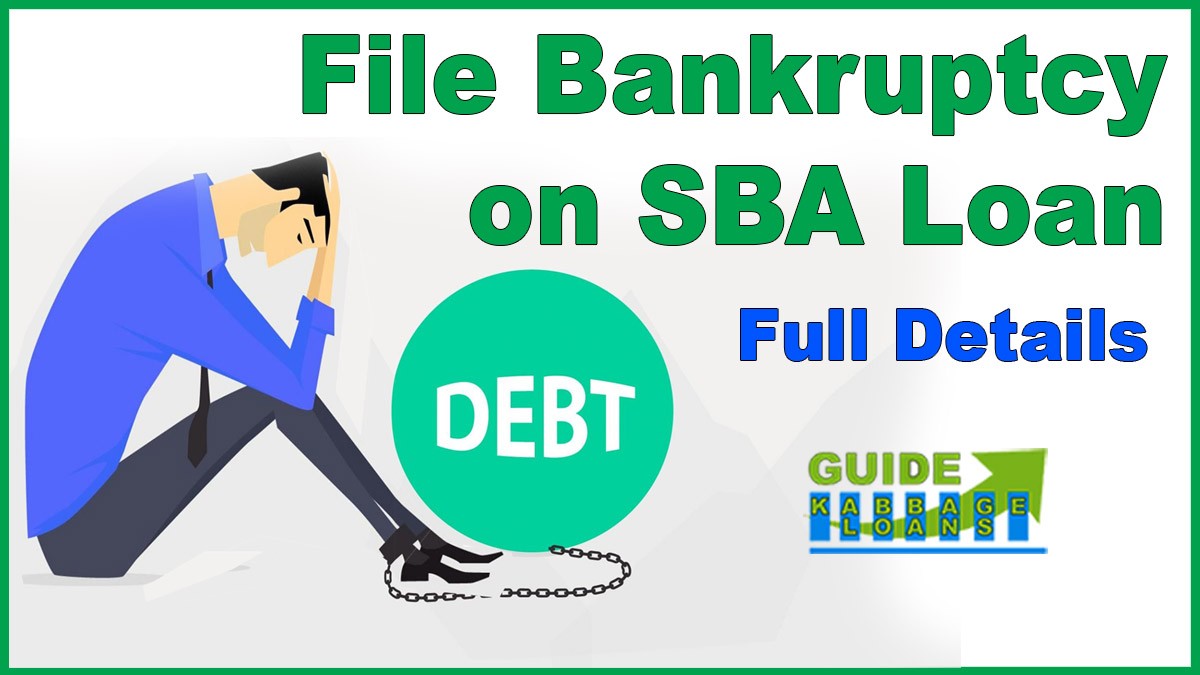When embarking on the journey of entrepreneurship, many small business owners find themselves in need of financial assistance, and this often leads them to the Small Business Administration (SBA). SBA loans are designed to provide accessible funding for businesses, yet the question looms large—what happens when a borrower cannot repay these loans? Can you file for bankruptcy on an SBA loan? This inquiry not only piques curiosity but also delves into the core of financial distress and the labyrinthine world of debt management.
Firstly, it’s essential to understand the nature of SBA loans. These loans are predominantly guaranteed by the federal government, thereby providing banks with an assurance that they will recoup a significant portion of their funds, even if the borrower defaults. This guarantee allows lenders to offer favorable terms, such as lower interest rates and extended repayment periods. However, this safeguard raises the stakes considerably when it comes to the consequences of bankruptcy.
Filing for bankruptcy can be a daunting process. It is often viewed as a last resort for those facing insurmountable debts. The two most common types of bankruptcy for individuals and sole proprietors are Chapter 7 and Chapter 13. Chapter 7 bankruptcy allows for the liquidation of non-exempt assets to repay creditors, while Chapter 13 involves a repayment plan over three to five years. This leads us to the crux of the issue: what does bankruptcy mean for those who have taken out SBA loans?
While bankruptcy can provide a fresh slate for many forms of debt, SBA loans present unique challenges. It is possible to discharge certain aspects of a personal guarantee attached to an SBA loan, but the path is littered with complexities. In instances where the loan was personally guaranteed, filing for Chapter 7 could potentially discharge the debt, though not without risk. If the borrower’s business continues to operate, it may be subjected to further scrutiny by the SBA post-bankruptcy.
Another critical aspect pertains to Chapter 13 bankruptcy, wherein borrowers have the opportunity to repay their debts under a court-approved plan. For those with SBA loans, this could mean entering a repayment plan that accommodates their financial reality while still honoring the obligations owed to the SBA. However, payments must be made according to the court’s schedule, and any future income increases may complicate the repayment terms.
It is crucial to acknowledge that filing for bankruptcy does not equate to a carte blanche discharge of all debts. The SBA reserves the right to pursue remaining balances post-bankruptcy, especially if the loan was not treated properly within the bankruptcy framework. For instance, if the borrower could prove that the debt was injurious due to fraudulent activities, the court might dismiss it; conversely, if the loan was used for personal enrichment beyond the business context, consequences can be severe.
A fascinating phenomenon arises when we consider why many business owners harbor an aversion toward bankruptcy. The stigma surrounding it can often overshadow the practical advantages it offers. Fear of loss of reputation, personal shame, and the haunting idea of financial failure often deter individuals from seeking help. Instead, they may choose to exhaust all means of keeping the business afloat, leading to burnout or personal financial ruin.
The implications of defaulting on an SBA loan are not limited to bankruptcy alone. One must recognize the cultural undercurrents that attach stigma to ‘failure’ in business. The narrative often revolves around the archetype of the resilient entrepreneur, who perseveres against all odds. This narrative fosters a society where financial distress and bankruptcy are perceived as personal failures rather than systematic challenges faced by many. A deeper inquiry into this reveals that many entrepreneurs feel the weight of expectation, often leading to damaging decisions in hopes of maintaining an illusion of success.
Considering the legal landscape, it is always prudent for borrowers to consult with a knowledgeable bankruptcy attorney who can provide tailored guidance. The reality is that navigating the complexities of SBA loans and bankruptcy can be labyrinthine—each decision carries weighty implications. Understanding the obligations that accompany the loan, the potential for personal liability, and the nuanced protections offered by various bankruptcy chapters can make the difference between recuperation and prolonged difficulty.
Ultimately, the decision to file for bankruptcy should not be taken lightly but rather approached with a balanced perspective. SBA loans, with their dual nature of opportunity and obligation, reflect the broader narrative of entrepreneurship itself; a landscape filled with risks, challenges, and the possibility of resurgence. As one navigates this journey, it is imperative to cultivate an understanding that seeking assistance through bankruptcy can often be a step toward rebuilding—rather than an admission of defeat.
In conclusion, can one file bankruptcy on an SBA loan? Yes, but it involves a complex interplay of legalities, financial implications, and emotional ramifications. The narrative around bankruptcy remains multifaceted, urging individuals to confront their financial realities with informed courage rather than capitulation. Resilience in the face of adversity is key, and understanding the avenues available can often pave the way for renewed success, both personally and professionally.
